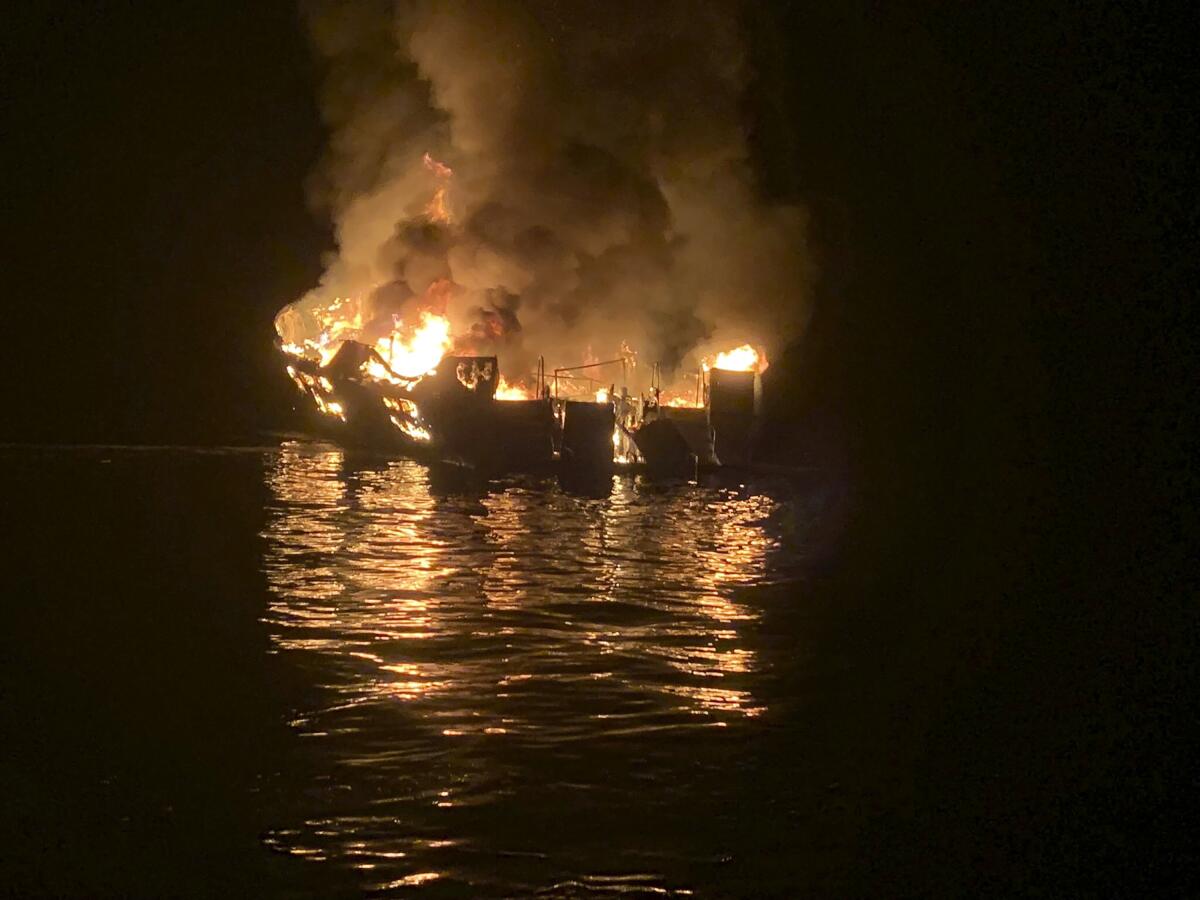Boat fire: Coast Guard will reconsider vessel safety improvements that were earlier rejected

- Share via
WASHINGTON — Days after the Los Angeles Times reported the U.S. Coast Guard had rejected federal recommendations that could help prevent boating tragedies, a Coast Guard leader said the agency will reconsider the measures in the aftermath of the Labor Day fire that killed 34 people on the Conception dive boat.
On Thursday, a House Subcommittee on Coast Guard and Maritime Transportation quizzed the Coast Guard and the National Transportation Safety Board about passenger safety on waterways.
At the start of the hearing, several Congress members said they were troubled to learn from the Times investigation that the Coast Guard had often ignored NTSB safety recommendations to improve fire-safety measures for nearly 20 years. The Coast Guard has the sole authority to mandate safety protocols on vessels.
“The United States has a history of taking a reactionary approach to safety, creating maritime safety laws that follow tragedy rather than preemptively strengthening safety requirements for a more robust fleet, one that is effectively regulated and inspected,” said Rep. Sean Patrick Maloney (D-N.Y.), chairman of the subcommittee.
“The Coast Guard’s repeated failure to embrace and act on the NTSB’s recommendations on passenger vessels has emerged as a persistent thread in recent maritime casualties. Recommendations from prior casualties continue to resurface in later accidents, and yet the Coast Guard refuses to act.”
Rep. Peter A. DeFazio (D-Ore.), chairman of the House Committee on Transportation and Infrastructure, said “the sea remains a relentless threat, one that can strike without warning, without mercy, and at any time.
“There is an old saying that all Coast Guard safety regulations are written in blood as each new regulation reflects the lessons learned from the latest marine disaster,” he said.
“The reality is that we will never be able to eliminate the risks of going to sea. What we can do, however, is remain steadfast in our commitment to ensure that for those who go to sea, they do so on vessels that are built, maintained and operated as safely as possible. We should all honor that pledge.”
For years, the NTSB repeatedly has called on the Coast Guard to require small vessels to establish procedures for conducting regular inspections and reporting maintenance and repair needs for all of a boat’s systems — including the hull and mechanical and electrical operations.
But the Coast Guard has pushed back on the recommendation, calling it “unnecessarily burdensome and duplicative of existing requirements.”
Rear Adm. Richard Timme, assistant commandant for prevention policy, said the Coast Guard created a task force to inspect vessels similar to the Conception and suggest what needs to be immediately adopted to protect passengers. He vowed the agency will not wait for any investigation to finish before enacting new measures.
“To this end, the Coast Guard will strive to continuously improve. We will get better,” Timme told the panel. “We will closely examine the findings of all marine casualty investigations to improve that framework. We will wholly fulfill our regulatory oversight role to keep the maritime public safe. It is my priority.”
The NTSB, an independent federal agency, has no authority to enforce its recommendations, so regulators such as the Coast Guard and the Federal Aviation Administration are not bound by them.
Brian Curtis, the NTSB director of the office of marine safety, reiterated the board’s recommendations for the Coast Guard to require smaller passenger vessels to create preventative and comprehensive safety programs.
“All passenger vessels should implement a safety management system,” he told the panel. The system “is essential for enhancing safety on board passenger vessels.”
Maloney said he shares the NTSB’s concerns. “Recent accidents on small passenger vessels demonstrate that poor preventative maintenance, lax fire prevention and inadequate crew training all continue as contributing factors leading to calamity. The Coast Guard is making a critical mistake by not acting more assertively on these recommendations.
Rep. Salud Carbajal (D-Santa Barbara) thanked the Coast Guard for helping in the Conception fire and questioned why the agency has repeatedly ignored NTSB recommendations.
“When you look at the track record of implementing the NTSB’s recommendations, it is not a good track record,” Carbajal said. “Over the years, we see tragedy after tragedy after tragedy happen, and the Coast Guard has a track record of inaction. I’m disturbed by some of the reporting following this tragedy.”
He then asked Timme to explain the Coast Guard’s failures to adopt NTSB recommendations.
Timme said that once the Coast Guard task force reports its findings to him, he will consider what “needs to change in the safety framework, including rules and policy around these passenger vessels.”
“That includes re-looking at the NTSB’s recommendations with regard to that,” Timme told Carbajal.
Timme did not provide a time frame for when the Coast Guard may adopt changes.
In September, a fire broke out on the Conception during a weekend diving excursion in the Channel Islands, killing everyone who had been sleeping below deck. Since the accident, investigators have cited some of the same deficiencies pointed out by the NTSB in other boat fires: lack of crew training and inadequate safety measures and maintenance.
A preliminary NTSB investigation found that the Conception had violated a requirement that it have a roving watch during the night, saying the five crew members who survived awoke to discover the flames. The agency also has raised concerns about the functionality of the two exits in the area where passengers slept in stacked bunks beneath the waterline.
The results from the NTSB investigation into the Labor Day disaster could take 18 months to complete. Agents from the FBI and the Bureau of Alcohol, Tobacco, Firearms and Explosives are trying to determine what sparked the blaze.
More to Read
Sign up for Essential California
The most important California stories and recommendations in your inbox every morning.
You may occasionally receive promotional content from the Los Angeles Times.












